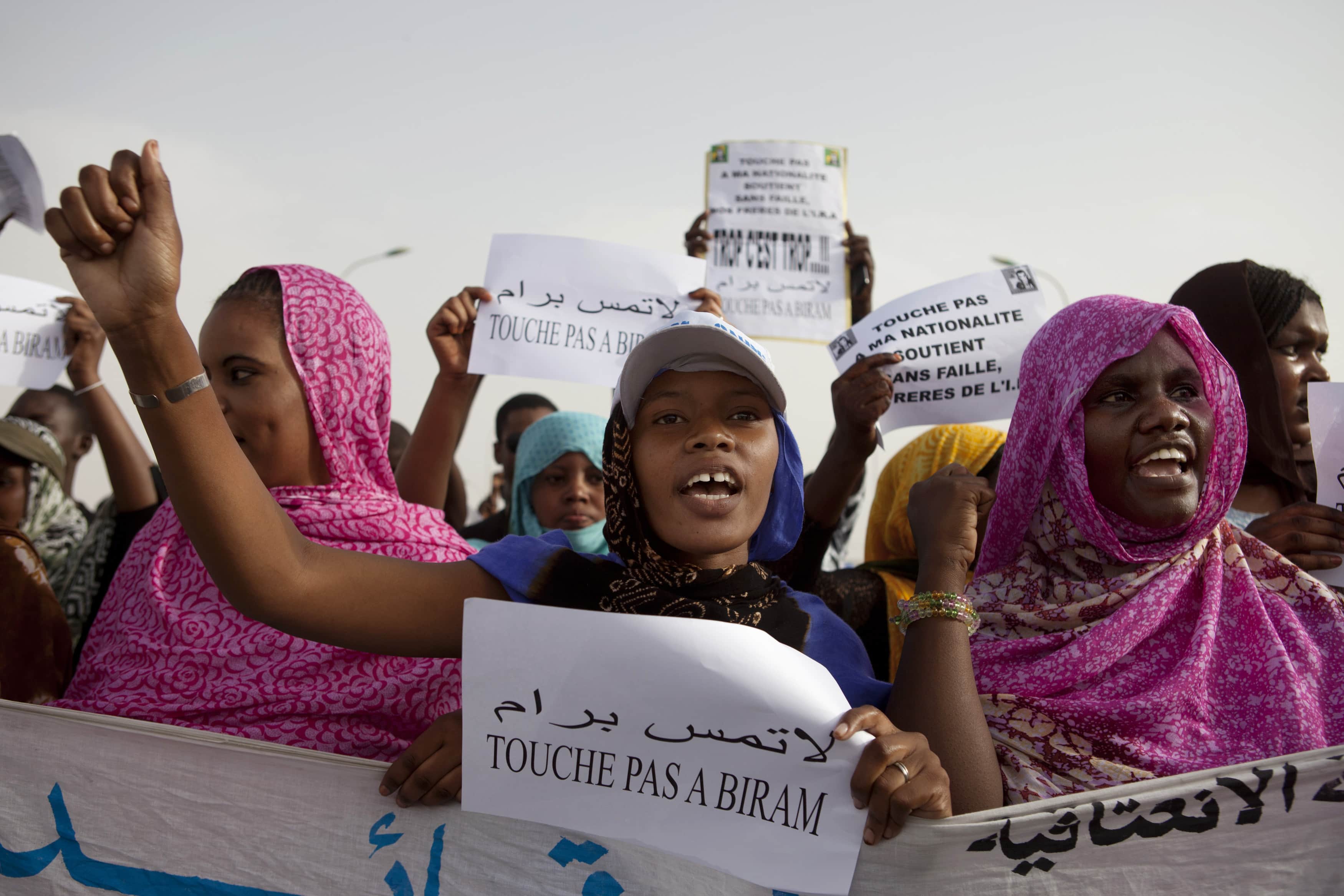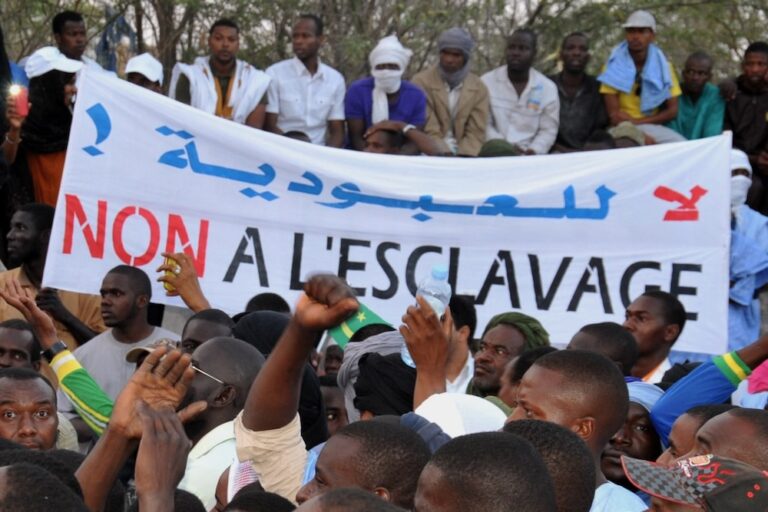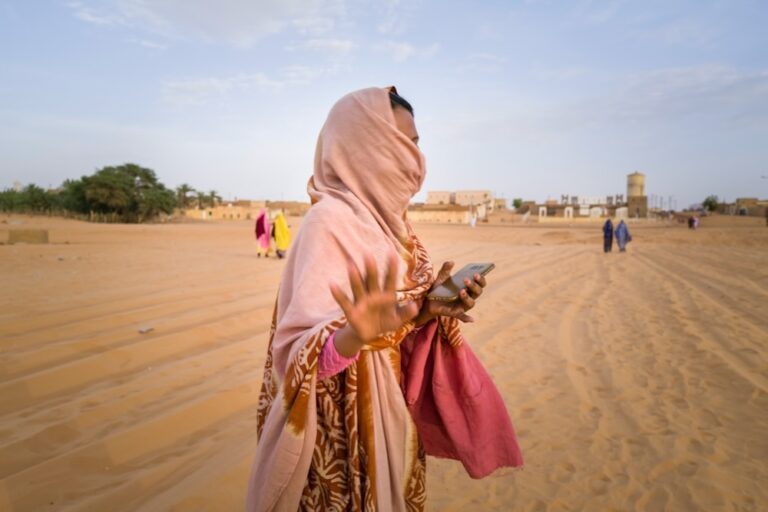On 11 November 2014, Biram Dab Abeid was beaten and arrested for his participation in an anti-slavery protest and remains imprisoned today. Freedom House interviewed Biram in December 2013. He discussed the dire situation surrounding slavery in Mauritania, which has the highest incidence of slavery in the world.
This statement was originally published on freedomhouse.org on 19 November 2014.
On November 11, 2014, Biram Dab Abeid, a prominent Mauritanian anti-slavery activist, was beaten and arrested for his participation in an anti-slavery protest and remains imprisoned today. Freedom House interviewed Biram in December 2013, just after he had been honored with the UN Human Rights’ Prize. In the interview, Biram discusses the dire situation surrounding slavery in Mauritania, which has the highest incidence of slavery in the world.
The interview was translated exactly as it was received, save for minor edits for clarity.
Background:
Biram’s organization, IRA – Mauritania, formed a Caravan on November 7 that visited rural villages to raise awareness against slavery and inform those susceptible of exploitation of their rights. A local government official from the town of Rosso issued a decree on November 10 banning the Caravan from entering Rosso’s city-limits. On November 11, Biram and his colleagues were attacked by riot police, arrested, and imprisoned. On the same day, IRA – Mauritania’s offices in Nouakchott were raided and sealed off by the Mauritanian authorities. IRA – Mauritania members held solidarity rallies elsewhere in Mauritania protesting these detentions, and were themselves arrested, bringing the estimated number of individuals arrested to 21. Read more here.
Please tell me your name and a little bit about your organization IRA-Mauritania.
My name is Biram Dah Abeid. I am the president of the Initiative for the Resurgence of the Abolitionist Movement in Mauritania. It’s a human rights organization that focuses on the fight against modern slavery in Mauritania, which affects descendants of the Haratin community [1].
How did IRA-Mauritania start? What drew you to start this organization?
Why did you become a human rights defender?
There are many things that motivated me to start this organization in Mauritania. I founded IRA-Mauritania with six friends on 23 October 2008. I had learned from my father who was a descendant of slaves and who had also suffered under slavery. I made a promise to my father that I would fight against slavery. Additionally, when I was growing up, I saw the isolation that slavery created around me. I realized that we are in a world which morally obligates us to help the population of slaves, who are primarily Mauritanian and are shut out from the rest of the world. It is our duty to restore their dignity and humanity. That is why I made this my calling.
What is the situation in Mauritania regarding slavery? And the ‘slave code’?
I can definitely speak about slavery and the slavery code in Mauritania. About 20% of the domestic population are enslaved, and of that, 80% are women and children. These are people born as property of another person and work without pay, rest or care. They do not benefit from education, work papers, or benefits. They do not have a place to sleep and the women are often subjected to rape at the whim of their masters.
All of these practices are legitimized by the slavery code which reigns in Mauritania [alongside the Constitution] having been legitimized in medieval koranic writings. Most importantly, this code condones slavery and dehumanizes slaves, regarding them as animals. The codes are vigorously practiced in Mauritania because they are seen as the only valid and official interpretation of the Islamic religion and are written into the constitution as “superior” and “divine.” They are used by the Supreme Court of Mauritania and comprise the foundation of the judiciary branch. Finally, these codes are used in every day life by administrative offices, the police force, and imams to legitimize their actions.
Are there any stories you can tell about freed slaves that you have helped?
IRA-Mauritania has fought to free a great number of slaves since 2008 and there are many stories that come to mind. As an example, I recall especially the story of an individual who we freed in 2008 along with her two brothers and sister. She and her brothers and sister were living about 400 km from each other, but they were totally separated. When they were growing up, they didn’t know one another because each member of the family was a slave in separate slave owner’s household. We freed and reunited them after 35 years of living apart. She was reunited with her brothers and sister and they started to live normally as a family. She was free to love and get married. Before we freed her she had had some rape-conceived children because her previous masters had raped her. She became a prominent freedom fighter of IRA, who regularly leads anti-slavery demonstrations. That is the story that I’d like to share.
Can you talk about how officials are targeting you for your work and how you handle it?
I can talk about the oppression and the violence that we experienced. Me, my friends and my organization….. and the list goes on if I were to talk about the aggression from authorities. Not only do we not have any privacy, but there are many times that we are violently abused and mistreated, humiliated, harassed, intimidated and portrayed as devils by the Mauritanian authorities, society and the dominate group that promotes slavery and has power over Mauritanian state. […] The violence, the torturing, the false and arbitrary imprisonment, the public humiliation that we have endured…. lots of our blood has been spilled. We have been stigmatized by some authorities. For months we have been imprisoned, dehumanized by state media. To aggravate the situation, the state has consistently portrayed us as non-Muslims, ‘devils’, ‘enemies of the state’ and therefore of God, and ‘mercenaries of Jewish infidels’. Our parents and children turn on the television to see the state’s leaders calling us all sort of names, asking that we be cut to pieces like dogs. Furthermore, there’s also the economical embargo that the state had imposed on us. We cannot work or feed ourselves. These are the sorts of difficulties that we experience from the state; our children cannot not even get an education.
What is the importance of civil society organizations like Freedom House in preventing slavery worldwide?
Freedom House and other similar organizations can help IRA-Mauritania by strengthening the abolitionist movement. Freedom House and other similar organizations can help those in Mauritania who are all victims of slavery and the discrimination that comes with slavery. They can help by reinforcing the abolitionist movement of IRA, since IRA will fight to abolish slavery as well as force the influence of slavery out of Mauritania. We have to conquer and eliminate slavery, change society, transform the environment and create the opportunity for an environment of rights, an environment of security, an environment of legality. So, Freedom House and other similar organizations must help IRA materially with logistics including computers, cameras and video recorders so as to diversify, propagate, and capitalize our fight. They can help with cars, and other means of transport that can help IRA reach victims in all areas of the country.
Freedom House and other organizations must help IRA shape international frameworks in regards to international rights and advocacy. They can help with IRA’s advocacy at the United Nations, the European Union, and at all other international platforms so that Mauritania complies with international law. Further, Freedom House and its partners can help to sensitize the public around these international norms. Such organizations can help IRA and its activists setup a platform to advocate to other influential state actors in Mauritania, in the United States, France, the European Union and other international actors that give aid to Mauritania. […] Freedom House and similar organizations can also help by providing lawyers to IRA to fight for the imprisoned activists that were falsely detained, in addition to medical supplies for IRA members who were persecuted, tortured and abused.
[1] Despite the official criminalization of slavery in 2007 up to half of the haratin (‘black Moors’) remain trapped in broad-based chattel slavery and are denied their basic human rights.
Freedom House is an independent watchdog organization that supports democratic change, monitors the status of freedom around the world, and advocates for democracy and human rights.



